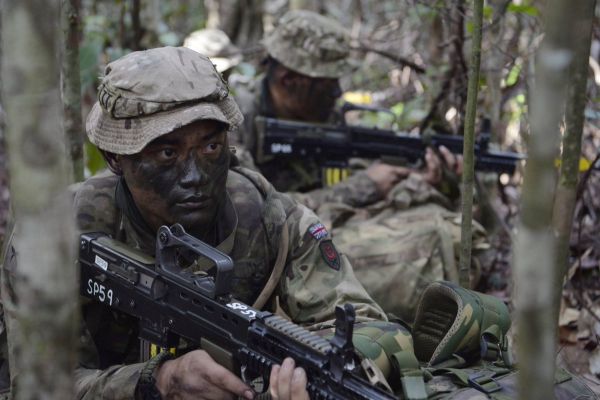Repelled 30 taliban...

Seen at warhistoryonline.com

Acting Sergeant Dipprasad Pun of the Royal Gurkha Rifles was the lone guard on duty, patrolling a small two-story outpost on the edge of Helmand province in Afghanistan; it was in September of 2010 on a cold, lonely night. The 31-year-old NCO was one in a long line of dedicated Gurkha militia who had served with the British forces since 1815.

In the beginning, he thought it might be a donkey or a cow, but when he went to reconnoiter, he saw two Taliban insurgents digging a trench for an improvised explosive device (IED) at the front gate of the outpost.
All of sudden a cow or a donkey or something honks out some noise outside the checkpoint where the Sergeant is sitting down quietly with his buddies; seriously, that’s how this story starts. Sgt. Pun automatically moved his head to look toward the noise and no sooner did he look out the window when his eyes instantly fell onto to two men kneeling in the middle of the road handling some kind of device. Pun’s head immediately started spinning, and alarm bells started ringing, and this combat-savvy Gurkha quickly sprang to his feet and hurried up the ladder to the top of the stockade to get a better look. Pun hollered at them to identify themselves. They sure did. The next thing you know, bullets are flying everywhere.

And now, suddenly, the peaceful silence of the Afghan landscape was filled with 7.62 mm bullets, epic vulgarity, and the familiar white streaked contrails of rocket-fired grenades. Before Pun could hardly blink an eye between 15 and 30 Taliban warriors initiated an attack on the outpost. Gunfire was zipping in from every direction; rocks and smoke were getting stirred up everywhere.
‘I tried to kill as many as I could because I thought I was going to die.’
But then, after a brief, frozen moment in time, the infuriated Sgt. Pun quickly and instinctively kicked into ‘Gurkha Mode’. In a moment of uncontrollable Berserker precision, Pun grabbed the powerful machine gun that was located on the roof, and said to himself that if he was going to die he was going to make goddamned sure that he wasn’t going to die alone – ‘I’m taking as many as possible of those Taliban -explicit- with me.’ With a mighty yell, the 5′ 7″ Sergeant yelled “I WILL KILL YOU ALL” in his native tongue. He grabbed the machine gun from its support and started firing chaotically at everything in sight
Suddenly, he realized that he was totally surrounded and that the insurgents were about to launch a carefully planned attempt to overrun the complex. The Taliban opened fire from all sides, demolishing the patrol position where Sergeant Pun had been on duty only a few minutes previously. Using the roof as his defensive position to protect the base, the Gurkha remained under continuous fire from AK 47s and grenade launchers for more than a quarter of an hour. During this firefight, most of the insurgents were around 50 feet away. But at one point, he turned to see a ‘gigantic’ Taliban fighter looming over him. The Gurkha soldier grabbed his machine gun and fired …. and kept firing at the militant until he fell off the roof.
.jpg)
When another insurgent tried to climb to his position, the Gurkha tried to shoot him with his SA 80 rifle, but it didn’t fire, either because it had jammed or because the rifle was out of ammunition. He was going to throw a sandbag, but it had not been tied, and the sand fell to the floor. Then he grabbed the tripod that supported his machine gun and threw it at the advancing insurgent while shouting in Nepali ‘Marchu talai’ (‘I will kill you’) and knocked him from his position. When the heroic Gurkha had used up all his ammunition, there were still two insurgents attacking his position, but he exploded a Claymore mine to fend off the attack.
At this point, his company commander, Major Shaun Chandler, with reinforcements, arrived at the checkpoint, praised him with a slap on the back and asked how he was. In total, he fired 250 machine gun rounds, 180 SA 80 rifle rounds, six normal grenades, six phosphorous grenades, five grenades from the rocket launcher and one Claymore explosive device.

The only weapon he did not use was the traditional Kukri knife; carried by Gurkhas because he didn’t have his with him. Sgt. Pun, who is married, is originally from Western Nepal; the village of Bima, and now lives in Ashford, Kent. His father and grandfather were also Gurkhas. His medal citation mentioned that his gallantry saved the lives of his fellow soldiers at the outpost at the time and prevented the checkpoint from being overrun.
The citation reads, in part: “Sgt. Pun couldn’t know how many enemy militants were attempting to overcome his position, but he searched for them from all positions in the compound, despite the danger, steadfastly moving forward to reach the best position to repel their assault.” Major General Nicholas Carter was commander-in-chief of the combined forces in southern Afghanistan, including the British forces, during Cpl. Pun’s deployment. He praised the soldier and the Gurkhas fighting in the Mercian Regiment, for their heroism in receiving these awards today.

The senior officer, who has received a commendation from the Queen of England for his leadership role in the Middle East said, ‘Their efforts have been outstanding. It has been my privilege to have members of the Royal Gurkha Rifles Battalion and the Mercian Regiment under my command. The ‘Conspicuous Gallantry Cross’ is not bestowed casually, it was a most noteworthy achievement by that particular young Gurkha.’
“Better to die than be a coward” is the world-famous motto of Nepalese Gurkha soldiers, who have been an integral component of the British Military.











